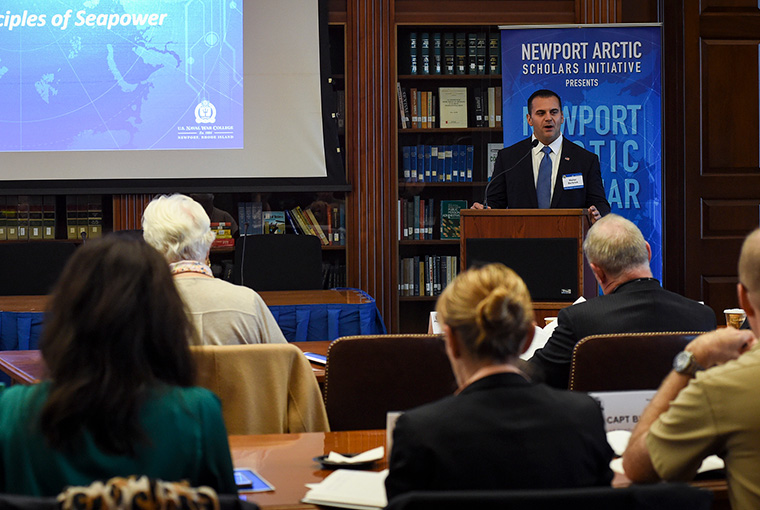Emerging Issues, Emerging Sea-lanes in the Arctic: NWC Hosts Second Newport Arctic Scholars Initiative

NEWPORT, R.I. -- As a warming climate melts Arctic ice, new territory is being created and so is competition for the now-accessible resources, causing an emerging issue for the United States and other world leaders.
A group of military and strategic thinkers met at U.S. Naval War College this week for the second installment of the Newport Arctic Scholars Initiative, a yearlong program gathering stakeholders from seven nations to discuss the new Arctic tableau.
“We face unresolved problems of military security in the Arctic,” said Walter Berbrick, founding director of the Arctic Studies Group at the college.
“If we focus on concrete actions to reduce fear and tensions, and if we continue the momentum from this seminar and this initiative, we can expect real results -- and real progress.”
Scholars noted that U.S. interest in the Arctic continues to rise -- with one academic describing an “awakening” in the current administration after Defense Secretary James N. Mattis in June said the United States needs to “up its game” in the region.
Meanwhile, rivals China and Russia are showing interest in new sea-lanes and mineral rights becoming available as Arctic ice recedes.
“This week, Sailors and scholars from Arctic states agreed on principles for maintaining and developing the Arctic as a peaceful and prosperous region,” said Lars Saunes, retired chief of the Royal Norwegian Navy, who now teaches at the Naval War College.
“The work has been strategically important as we take a bold look into the long-term horizon and try not to be limited by the current global security situation,” said Saunes, who serves as co-lead Arctic Initiative scholar with Berbrick.
The nations participating in the three-day seminar this week were Canada, Denmark, Finland and Norway, in addition to the United States.
One of the days was devoted to understanding the concerns and interests of Russia in the region, where it shares challenges and responsibilities with its Arctic neighbors.
While Russian representatives couldn’t be included in this session, the three-day conference devoted a full day to hearing from experts in the field of Russia studies.
“Russia looks at the world and sees there are two types of countries. You are either setting an agenda or you are swallowing someone else’s agenda,” said Nikolas Gvosdev, Naval War College professor of national security affairs.
“Russia’s view has been that, as one of the great powers, it always wants to make sure it is on the agenda-setting side of the table.”
Another scholar said the Arctic remains one region where Russia is inclined to work with others, despite the growing friction between the United States and Russia on issues elsewhere.
“It’s still true that Russia is more interested in cooperation in this region than anywhere else, because it needs it,” said Dmitry Gorenburg, a senior research scientist at CNA.
“For that reason, it is continuing to work through institutions like the Arctic Council.”
The final Newport Scholars Arctic Initiative meeting is planned for April 2019 in Bergen, Norway.
The group intends to publish principles for keeping the Arctic peaceful and stable.
